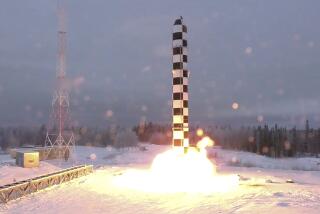Soviets Say U.S. Tries to Wreck Arms Accords
- Share via
MOSCOW — The Soviet Union charged Tuesday that the United States is trying to destroy nuclear arms control accords despite President Reagan’s conditional promise to continue to comply with the second strategic arms limitation treaty.
Moscow’s reaction to Reagan’s long-awaited announcement Monday was tougher than many Western diplomats had expected and cast a shadow over nuclear arms negotiations in Geneva.
A statement issued by the government through Tass, the official news agency, accused the United States of gradually “crawling” out of the unratified 1979 SALT II treaty instead of renouncing it entirely.
Reagan announced that the United States will abide by the terms of the treaty so long as the Soviet Union shows comparable restraint and rectifies what the Administration calls previous Soviet violations. But the Tass statement brushed off Reagan’s decision as a public relations gesture and renewed its contention that the United States is seeking a one-sided military advantage.
Mythical . . . Imaginary
It called Reagan’s charges of Soviet violations mythical and imaginary.
It challenged Reagan’s assertion that the Soviet Union violated the treaty’s ban against developing more than one new strategic missile by testing a model identified by Washington as the SS-25.
“It is well known to the President that there exists no second new type of a Soviet strategic missile,” the statement said. “The old missile SS-13, which is being modernized in strict accordance with the SALT II treaty, is being presented as a new (SS-25) missile,” it said.
Reference to the SS-25 as a new missile, the Soviet government said, is designed to justify production of the Midgetman missile as well as the controversial MX missile, which represents the one new U.S. missile allowed under the treaty.
The statement also belittled Reagan’s decision to take a missile-firing Poseidon submarine out of service when a new Trident submarine joins the fleet later this year in order to conform with the treaty’s missile limitations. Tass said this will not change the overall picture.
“One should not be deluded that the U.S. side will be allowed to determine as it thinks fit which obligations will be observed and which should not,” the government said, adding, “It is a dangerous misapprehension to expect that the other side will be adapting itself to such a line of the U.S.A.”
More to Read
Sign up for Essential California
The most important California stories and recommendations in your inbox every morning.
You may occasionally receive promotional content from the Los Angeles Times.













